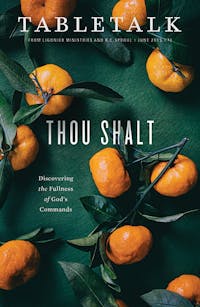
Request your free, three-month trial to Tabletalk magazine. You’ll receive the print issue monthly and gain immediate digital access to decades of archives. This trial is risk-free. No credit card required.
Try Tabletalk NowAlready receive Tabletalk magazine every month?
Verify your email address to gain unlimited access.
I have heard people say that the Bible is just a list of do’s and don’ts. People who say that have not read the Bible. In order to combat this sort of thinking, some Christians will quickly respond by arguing that the Bible is not a list of do’s and don’ts at all. But when they do that, they throw out the baby with the bath water. Those who have read the Bible will know that it is not just a list of do’s and don’ts, nor simply a how-to manual, nor a mere guide for moral living. Nevertheless, the Bible does in fact tell us what to do and what not to do. It tells us how to live moral lives that please God, and it provides us with God’s rules for all of life. The Bible is not just a list of do’s and don’ts, it’s far more than that—it is God’s grand story of His reign and redemption. Nevertheless, it does indeed contain God’s lists of do’s and don’ts that we might know how to love, obey, glorify, and enjoy God.
Christianity is not a religion of moralism, it is a gospel religion of grace. It is a religion established on a relationship. It’s not either/or, it’s both—a relationship and a religion. They are not mutually exclusive, and we do well not to pit one against the other. Our gospel relationship with Jesus Christ, by grace alone through faith alone, is the foundation for our all-of-life-encompassing gospel religion. Our relationship with Christ naturally leads to pure and undefiled religion (James 1:26-27). Religion is a helpful word we use to describe our Christian faith, which encompasses every aspect of our Christian lives, rooted in and flowing out of our spiritually regenerated new hearts and minds, and founded on the relationship that God has established with us by uniting us to Christ. In the fourth century, Augustine advocated using the Latin word religio by highlighting its etymology religare, which means to join or bind together as in a covenant bond between man and God. The word religion, rightly understood, joins together everything we believe as we live it out in all of life. The Dutch Reformed theologian Herman Bavinck writes: “Religion must not just be something in one’s life, but everything. Jesus demands that we love God with all our heart, all our soul, and all our strength.”
Our religion is established on Jesus Christ, who did not come to abolish the law but to fulfill it (Matt. 5:17). Christ fulfilled all the righteous demands of the law in His life so that His death would be a perfect atonement for our sins. Indeed, we are justified by works—His works, not ours. Christ perfectly kept His Father’s list of do’s and don’ts for us. And He did so not so that we might ignore God’s commands, but so that we might no longer be slaves of sin but slaves of righteousness. Christ frees us by faith that we might bear fruit. To be sure, we are saved by faith, not fruit, but we won’t be saved by fruitless faith. God’s grace enables us and His Spirit sustains us, helping us in our weakness to pursue holiness as we rest in the holiness of Jesus Christ. For, as Martin Luther said, “Faith cannot help doing good works constantly. It doesn’t stop to ask if good works ought to be done, but before anyone asks, it already has done them and continues to do them without ceasing.”
